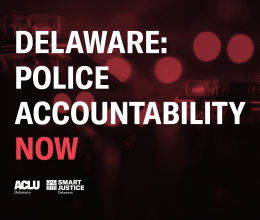Senate Bill 149, sponsored by Senator Elizabeth “Tizzy” Lockman and Representative Kendra Johnson, aims to amend the Law Enforcement Officer’s Bill of Rights (LEOBOR) to increase transparency and accountability. The bill would make police disciplinary records public and enable the creation of community oversight boards with the power to hear and decide police disciplinary matters — measures that Delawareans overwhelmingly support.
These changes are important first steps to fundamentally changing the way Delaware’s policing system operates, so it’s crucial that lawmakers and stakeholders know they have your support on SB 149.
Senator Lockman is hosting a series of virtual public sessions on SB 149 this fall, and we’re calling on Delawareans to make their voices heard by attending and submitting public comment at these sessions — that includes you!
SB 149 Listening Session Toolkit
Join us at these upcoming virtual public sessions to learn more about SB 149 and stand up for police reform in Delaware:
SB 149 Community Listening Session
Tuesday, November 23, 6:30 p.m.
Register
Plan your public comment and help us spread the word with our SB 149 listening session toolkit.
Why Do We Need to Amend LEOBOR?
Delaware’s Law-Enforcement Officers’ Bill of Rights (LEOBOR) has fueled police abuse incidents by making it virtually impossible to discipline police officers for misconduct or to know any details of misconduct incidents. Delaware is the only state that specifically codifies the confidentiality of law enforcement personnel records from public scrutiny — and no other Delaware public employees enjoy equivalent protections when it comes to disciplinary matters.
Transparency and accountability are necessary for due process, a fairer criminal justice system, trust between our police and communities, and trust within law enforcement agencies, but currently, police misconduct records are only available to a civil plaintiff suing an officer for causing injury in their official duty.
With the staggering number of police-involved shootings that occur each year in Delaware, officers must be held accountable to earn trust and protect public safety.
Community Oversight Boards
Community oversight boards are an independent body of people who are not police, who review incidents of police misconduct. LEOBOR prevents community-led groups, such as COBs, from effectively reviewing, investigating, and disciplining officers in misconduct cases.
At a minimum, we need to amend LEOBOR to allow local civilian oversight boards that can review, investigate, and discipline officers in misconduct cases.
Public Disclosure of Police Disciplinary Records
Delaware’s Law Enforcement Officers’ Bill of Rights LEOBOR statute is the worst in the nation for transparency, making the state a leader in police secrecy. Under current laws in Delaware, the public is not guaranteed any transparency in any police-involved incident.
Delaware’s LEOBOR makes public access to police investigations nearly impossible. The public has almost no insight on why an incident occurred, what could have been done to prevent it, or what disciplinary actions, if any, happened as a result of the investigation.
Fifteen states have versions of a LEOBOR statute, but only Delaware’s statute makes internal police investigation records completely confidential forever.
The secrecy surrounding internal police investigations fuels distrust and creates a wall between the police and the communities they’re supposed to serve. We need to revise LEOBOR to make police disciplinary records and use of force reports public record.

